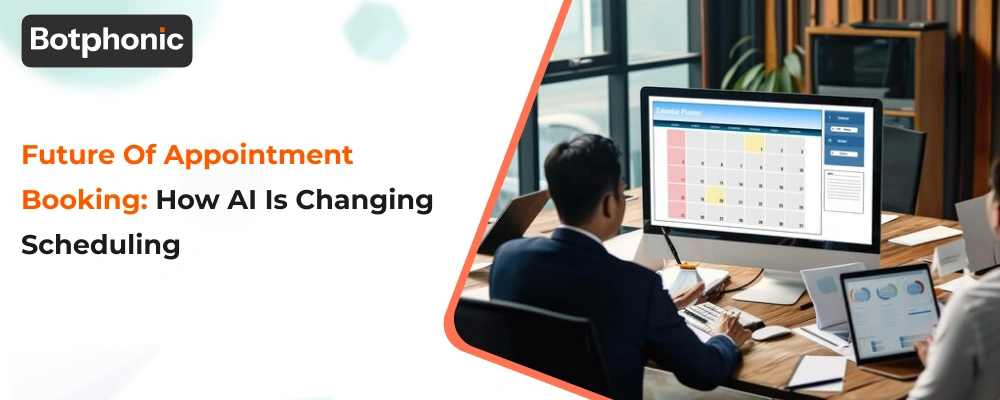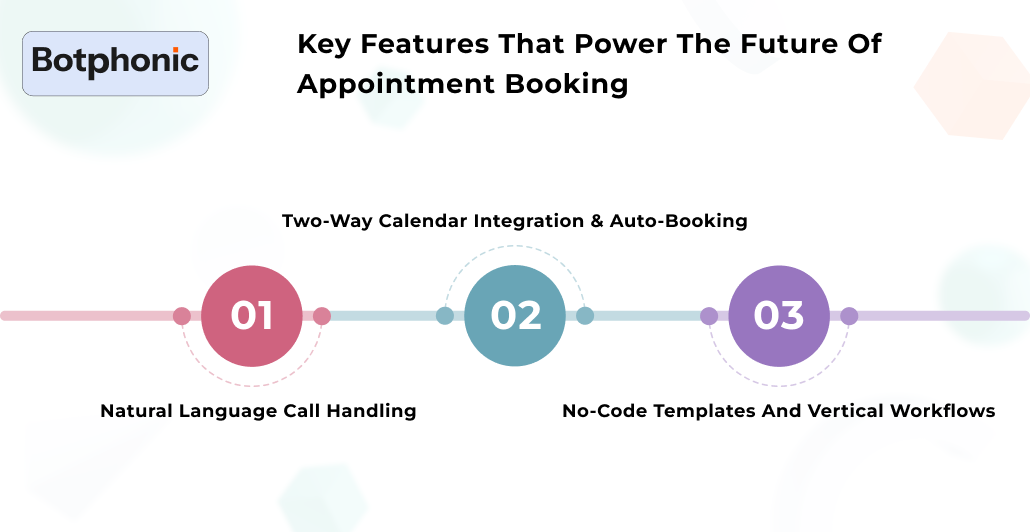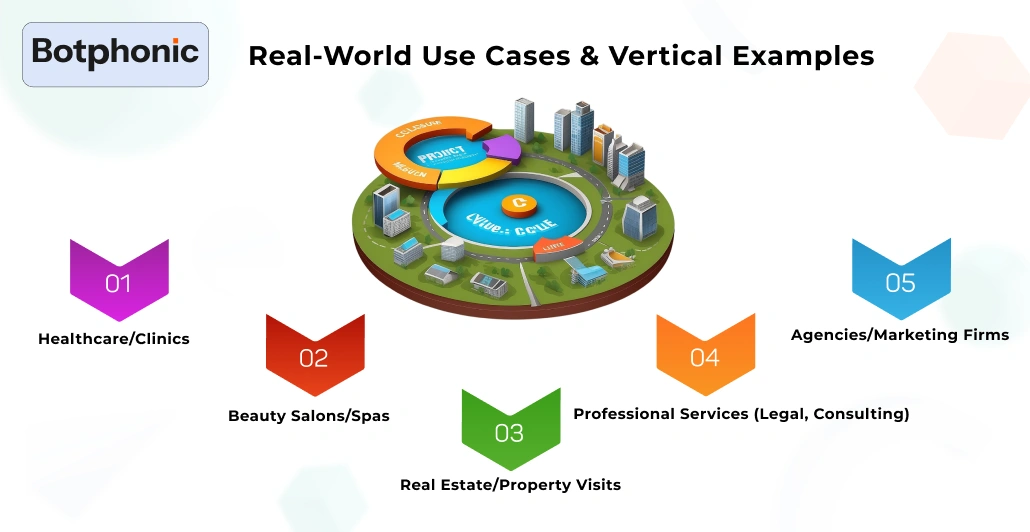
Summarize Content With:
Summary
This blog explores how AI technology is revolutionizing appointment management. We elaborate on the concept of a voice AI receptionist or an AI call assistant. Also, it will outline its principal features, enumerate the advantages for various user groups, and cite actual examples. Additionally, discuss how to welcome this technology, particularly via Botphonic.
Key Takeaways
- By utilising AI, the appointment scheduling experience is transformed into a fast, automated solution with a zero-error rate.
- By utilising an AI call assistant/voice AI, manual labour in scheduling can be eliminated.
- Intelligent scheduling of working processes will make the business, workers, and customers happy and equitable.
- The transition from traditional to new is greatly facilitated by Botphonic, leveraging its expertise.
Introduction
Try to visualise the scenario whereby a client calling your business is automatically inserted into your system with his/her time immediately reserved. A missed call will never happen to you. No more the manual way of back and forth through conversations.
All you have to do is lounge. This is the spirit of the future of AI appointment booking. We will explain the working principle of AI call assistants, voice AI receptionists, and AI receptionist systems, as well as the remarkable changes in scheduling, and how Botphonic is leading the way. Let’s move on.
Why Do You Need AI for Appointment Booking?
Appointment booking is at the centre point where customer demand and operational frustrations meet. One of the reasons businesses lose their leads is that staff are unable to take calls 24 hours a day, 7 days a week. People call after hours, or staff forget to return calls, or double-book by mistake.
Because scheduling is divided into numerous microsteps, including checking the calendar, verifying availability, and matching preferences, it also has many points of friction. Humans make errors; they have to wait for replies and lose time.
This is where AI can play a role. The future of appointment booking with AI means eliminating all the points where problems occur. An AI call assistant can pick up a call at any time, speak courteously, check calendars, confirm time slots, and even deal with reschedules. An AI system supported by voice AI can scale without weariness or mistakes.
Furthermore, customers nowadays expect prompt service. They dislike waiting and may walk away if the process proves to be slow. AI is the one that matches these customers’ wishes. And that’s not all, data on peak times, no-shows, and preferred slots is stored in the calendars and call logs. AI is the one that can analyse it to improve the scheduling system over time.
Learn more: What Is AI Appointment Booking? A Complete Guide
Key features that power the future of appointment booking

AI-powered appointment scheduling features are based on the core features of the system we will discuss here. Every paragraph below is about one such feature.
1. Natural language call handling
One of the major changes is that the AI must speak in a human-like way. Thus, it allows natural, flexible conversations rather than strict menu trees. Besides that, the AI must understand the user’s intent, maintain context, request clarification, manage interruptions, and even adapt.
If a customer says: “I want to see Dr Singh next week in the morning,” the system at minimum needs to pull out the words appointment, Dr Singh, next week, morning and present time slots that fit these criteria. In case the user states “No, afternoon is better,” the system is supposed to make the change.
Besides that, it should be able to take care of the small talk (“Hi, I hope you are well”) or the unexpected questions (“What’s your address?”) and direct the conversation accordingly.
Natural language call handling eliminates the sources of frustration. The user does not have to stick to the commands given in a rigid way. It feels like a conversation. As a consequence, booking conversion is levelled up.
2. Two-way calendar integration & auto-booking
A system should be able to interact with your calendars (Google Calendar, Outlook, clinic software, etc.) in a bidirectional way. Real availability must be what the AI sees when it suggests a slot. It should then go ahead and write the confirmed slot onto the calendar. AI should be able to see that time block when the staff members block the time manually.
Auto-booking is the feature wherein the AI will write down the chosen slot without the intervention of a human once the conversation has confirmed the slot. Thus, the user gets the confirmation straight away.
Without two-way integration, the AI runs the risk of double booking or giving off times that are unavailable. The AI is then trustworthy and accurate with integration.
3. No-code templates and vertical workflows
The workflow of each field (dentist, spa, therapy, and real estate) is different. The system needs pre-made templates. Users without programming skills should be able to set it up without writing any code.
For example, a clinic’s flow may be: “What type of appointment: consultation, follow-up, lab test?” location, physician, and preferred date/time, etc., might be the next questions. A spa would then inquire about the service type, duration, and staff preference.
Vertical workflows modify the questions, the logic, and the confirmations to fit the specific needs. No-code templates enable businesses to quickly set them up.
Real-world use cases & vertical examples

We are going to explore how AI-powered appointment booking will revolutionise various industries in the near future.
1. Healthcare/clinics
Patients are phoning to make appointments with doctors for blood tests, visits, and follow-up. AI is taking the lead in the whole process, starting with the call handling, booking slots, and even sending the reminders. Botphonic is a health-based AI which, apart from coordinating registration and the calendar of doctors, also provides language support.
2. Beauty salons/spas
Clients feel free to call and book skin care treatment, massage, and hair sessions. AI calls the client to ask for the desired service, stylist preference, preferred time and gets the confirmation.
3. Real estate/property visits
Motivated buyers call for house visits. AI chooses the visiting time, picks up the address, the buyer’s name, and the time. Botphonic claims via their real estate webpage that it schedules on-site visits through calling.
4. Professional services (legal, consulting)
Clients are scheduling calls for consultations. AI enquires about the consultancy type, availability, and confirms.
5. Agencies/marketing firms
Prospects want appointments or discovery calls. AI can triage and schedule. One of the uses of Botphonic is agencies’ client meetings management, as stated on their site.
How does Botphonic stand out?
While talking about the future of appointment scheduling with AI technology, Botphonic is the one that comes immediately to mind, being at the forefront and the most distinguished of all. This is the way:
- Scheduled call automation with focus: Botphonic is not just another chatbot. It mainly focuses on voice-call communication, scheduling, and booking of appointments. The main product of the company is an AI call assistant/voice AI receptionist.
- Feature sets matching requirements: The building features natural dialogue, sentiment analysis, summarisation, multilingual support, and analytics.
- Support of industry vertical: They present real estate, healthcare, and agencies as potential users.
- Ease of use and templates: Botphonic has completely customizable templates for businesses that can then roll out their product without any deep technical knowledge.
- Human-like voice & conversation fidelity: A main part of their promotion is the emphasis on talking so that the users get the impression of talking with a real human being.
Today, try Botphonic’s Voice AI Appointment Scheduling and understand how simple the automation can be.
Try Borphonic.AI Now!Conclusion
The future of AI appointment booking is not a far-off scenario; it’s happening right now. For instance, the introduction of voice AI and AI call assistant ensures a smarter, quicker, and less error-prone method of managing appointments. Fundamentally, these various features, such as conversational calls, calendar interoperability, pre-made scripts, multilingual capability, and the availability of insight, work in synergy to change the whole picture of the scheduling process.
Thus, the concept of scheduling turns into something that is no longer the concern of anyone in the system, but rather the satisfaction of all: the end-users, the staff, the business, and the overall organisation. The evidence of it happening today is captured through respective examples from hospitals, beauty parlours and properties.
Botphonic is a remarkable and singularly targeted platform for this technological shift. The proper deployment of a company’s services will bring with it a not-too-distant future, so that loss of calls is minimal, conversion rates are maximised, and clients are well pleased with the service.
Don’t resist it. Experience Botphonic’s trial, get on board with voice AI scheduling, and become the future of AI integration into the cognitive era.

